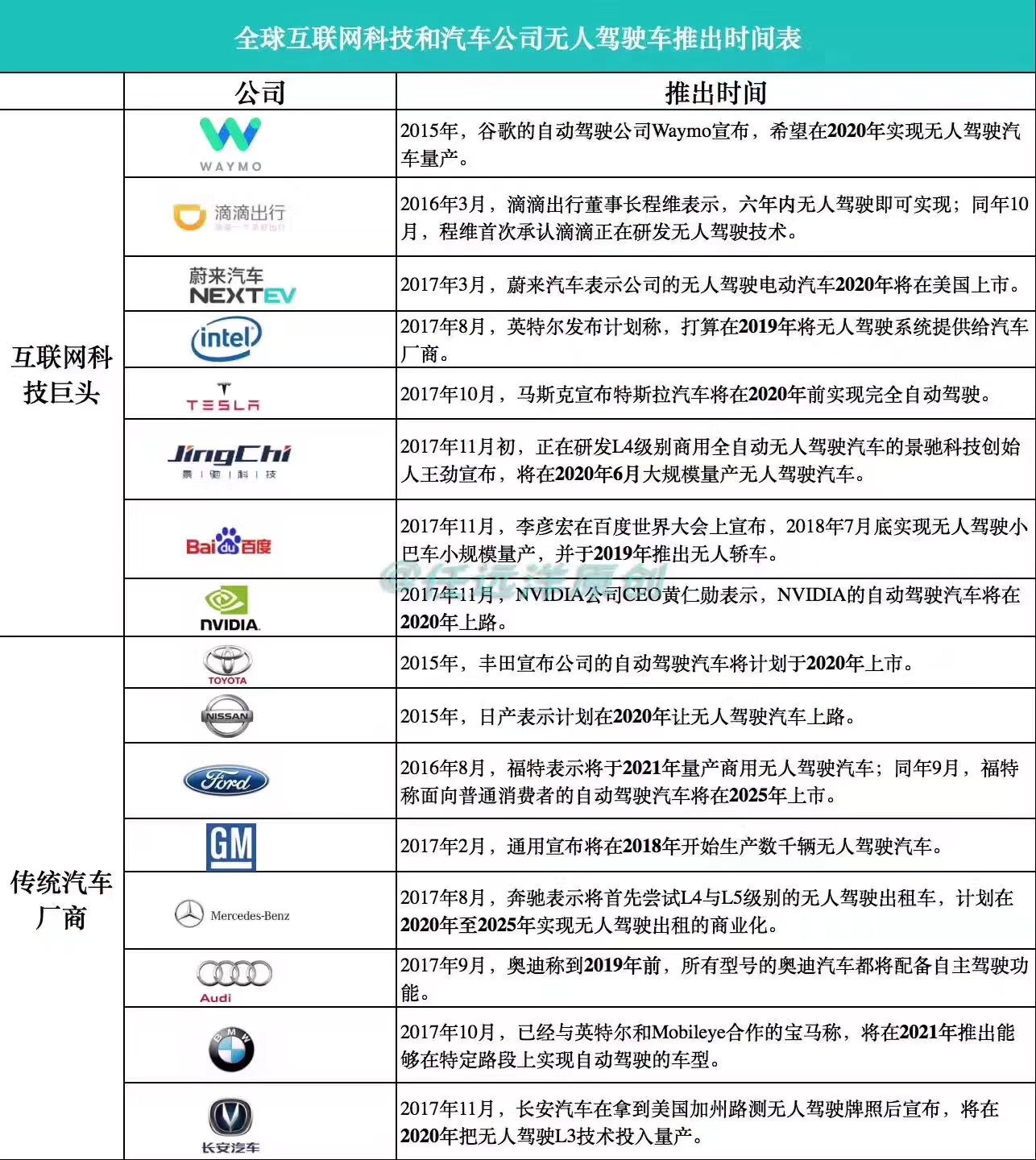How many kinds of smart cars will appear in the cities of the future, and no one can clearly estimate them. It can only be confirmed that the world is marching into the era of “no one†with great fanfare. Whether it is engineers, entrepreneurs, scientists or investors, the degree of demand for talents in the industry and the strength of open support for capital will only be 2018. Blockchain can depress the thunder of unmanned driving.
On March 1st, SAIC and Weilai had just obtained the license for the road test of unmanned vehicles in Shanghai. On the 7th, Baidu Li Yanhong stated to the media that it is applying for a license and it is necessary to achieve a road test in the first half of this year;
the other side,
Jingdong, SAIC Datong and Dongfeng Motor have developed new energy unmanned trucks and electric vans;
Alibaba teamed up with SAIC to establish Zebra Smart Solutions;
Tencent Guangzhou Automobile has made a number of smart car trips;
Huawei Dongfeng Motor Co., Ltd. cooperates to create a "smart car"...
Suddenly, like a spring breeze, thousands of trees pear blossom. How many kinds of smart cars will appear in the cities of the future, and no one can clearly estimate them. It can only be confirmed that the world is marching into the era of “no one†with great fanfare. Whether it is engineers, entrepreneurs, scientists or investors, the degree of demand for talents in the industry and the strength of open support for capital will only be 2018. Blockchain can depress the thunder of unmanned driving.
“Traditional driving schools will gradually disappear, professional drivers may be reduced, insurance premiums may be reduced, vehicle maintenance personnel may become IT specialists, and vehicle interior space may change consumption scenarios...†After only a few years, the story has begun to change dramatically.
8 giants and 8 major manufacturers, "China's speed" can not be ignored
Who has the loudest voice in the market? All parties have resorted to full horsepower to cater to this huge wind.
Because before the new pattern has been formed, who is the first to land, whoever is the boss.
According to incomplete statistics, at present, there are at least eight Internet giants and eight auto manufacturers in the world of driverless cars.

At the CES at the beginning of this year, Baidu showed its new progress for the first time: Apollo and DuerOS. Apollo was formally released in April and has evolved to version 2.0 in just 9 months. It frees training data and auto-driving software to developers and provides developers with an awareness system, route planning, and vehicle control through an API or SDK. Waiting for unmanned driving ability. It was one of the biggest achievements in the global unmanned area that year.
Baidu’s partner in the driverless area is even more compelling: there are no shortage of leaders in various fields such as Bosch, Blackberry, Microsoft, and Ford. In the early stage of the development of the industry, Li Yanhong must show the world “Baidu Super Speedâ€.

But Baidu still has a lot of pressure to face other sounds in the market. For example: Tencent, Ali, or even new opponents, like Weilai, Jing Chi, Didi......
The appearance of Weilai is known to be against Tesla. The founders who have their own aura have given it great hopes: Li Bin, the founder of YiChe.com, Li Xiang, the founder of the car home, and Tencent. Sorghum Capital and Shun Capital.
In March 2017, Weilai said that the company’s unmanned electric vehicles will be listed in the United States in 2020. If the market is successful, on the one hand, drone landing will be brought to a climax, and more importantly, the capital players behind will be rewarded. In order to achieve the grand goal, the capital is bound to support the unmanned R&D of the Weilai car more quickly and efficiently. The strength should not be underestimated.

In addition to these relatively mature companies, there is another company that has become the latest talk in the field of unmanned vehicles - Jing Chi Technology.
Because the dispute with Baidu does not clean up the chaos, Jing Chi climbed onto the table. Even if the result is Wang Jin's departure, Baidu recruits An Jing Chi, besides gossip, only the Pre-A round of Jing Chi has become The "representative" in the human industry. All eyes on the market have shifted to this team: members have a luxurious background, a high technology base, rapid growth, technical solutions for unmanned vehicles, intellectual property based on software and algorithms, licensing through technology, and joint design, development, and operations. The flag that Wang Jin once set out to "manufacture large-scale production of unmanned cars in June 2020" is still worth looking forward to.
Internationally, the ambitions of giants with relatively strong technological foundations are also evident. Google has been involved in driverless technology since 2009. Google’s unmanned vehicles have longer mileage, more experience, and relatively mature technology than any other company in the world. The company’s driverless cars have undergone several upgrades, and every year, 10,000 to 15,000 miles of automated driving test mileage accumulates. Google’s self-driving company Waymo also announced in 2015 that it hopes to achieve in 2020. Mass production of driverless cars, in the future is likely to appear at the door of each household a Google unmanned car.
Including Tesla, Intel, NVIDIA companies are also constantly testing the water, to fight for the freedom of the car as soon as possible, on the road.
The proposal was revisited in the "two sessions," and the policies were "on the road."
Macroeconomic policies will always listen appropriately to market voices.
“To build a new global high ground for the autopilot policy and build a platform for the “Chinese car brainâ€â€ This is an important proposal of Li Yanhong on artificial intelligence at the two sessions.
In the early stage of the industry where technology was launched, Li Yanhong’s remarks placed the unmanned attention at a new height.
China's policy response is not slow. At the end of last year, Beijing issued two guidance documents, "Accelerating the Guidance of the Work Related to the Road Testing of Autopilot Vehicles" and "Implementation Rules for the Management of Autopilot Vehicle Road Testing". In the opening year of 2018, the Shanghai area preceded Beijing and issued the nation's first batch of intelligent network-linked auto open road test plates, and at the same time, delineated relevant test roads. Made in China 2025 requires domestic companies to take the initiative in ten important strategic industries such as artificial intelligence and robotics.
The environmental policy is not lagging behind, but compared with the United States, there are more than 20 states that have introduced autonomous driving-related laws and regulations. Dubai has put driverless taxis into use, EU unmanned cars have entered the scene to detect scenes, and the British government has been in 2021. Years ago, the realization of drones was on the road... Only China and Beijing have put in place relevant testing regulations. China's policy promotion efforts are still slightly inferior.
As Li Yanhong said: "This is not enough. A car is a big industry and involves many aspects. For example, auto-piloting high-definition maps and the anti-hacking problem of driverless vehicles."
In Li’s view, the government does not need to worry about building a car, because giant companies are already chasing after you and are tireless. Instead, the government needs to provide more macroscopic support to start major actions on roads and infrastructure, such as reducing the difficulty of technology development for autonomous driving.
"Non-guest" is more easily landed, overflowing the market will be in the order of trillions
"Dare to be the first in the world" must overcome a series of problems.
For an unmanned vehicle, it will be able to ride with 100 billion kilometers. However, Google, which is at the forefront, has only tested 6.44 million kilometers. It is difficult to say how safe it is.
"There is a lot of sensory technology here. The car is on the road. It needs to be able to sense where the car is going in front and where the car is going. But there is no perception of going under." Wu Enda mentioned the driverlessness unobtrusively. problem lies in.
Although artificial intelligence serves as the driverless technology foundation, unmanned applications are more complex than artificial intelligence. Those so-called blind spots and opaque technologies are closely related to life. When Google’s self-driving car crashed, Uber’s car was driving in a red light, driving in the wrong direction, and Tesla’s auto-driving accident caused the driver to die. These serious accidents will greatly affect people’s trust and expectation for autonomous driving technology. In China, more than 260,000 people die every year due to road traffic accidents. Under a conservative attitude, society still needs to overcome certain psychological barriers when it comes to accepting unmanned vehicles.
With the development of technology, the safety factor will eventually reach the standard. The maturity of high-precision maps, the perfection of on-board communication modules, and the integration of sensors will make the landing clearer. Only in the short-term, "non-offer" production of unmanned vehicles is still easier to achieve.
In December 2017, no bus in Shenzhen went hot. Its appearance makes it possible for the development prospects of unmanned vehicles.
For example: scenic tourist vehicles, garbage trucks, clean road vehicles, etc.
Some research institutions expect that China's smart car market will reach 60 billion yuan by 2020. In the future, driverless driving will not only cause changes in the field of travel, but even the logistics industry and the environmental energy industry will all suffer. Whether carrying passengers or not carrying passengers, this will be a trillion-level market.
Driverless driving will have a huge spillover effect, which will have a huge impact on car companies, transportation, logistics, energy, real estate and other industries. By that time, it will no longer be a breakthrough in automotive technology. It will open up new consumption scenarios and activities in the car will be more abundant: unexpected things such as catering, service, entertainment, and office will happen one after another.
However, it still takes time to give us the answer.
Conclusion
From the initial curiosity, to academic research, to real technology landing, to meet the curiosity of change in driverless change, but also with the algorithm to play with peace of mind. The deregulation of traditional depots, technology giants and capital forces is a general trend. The mutual binding of all parties is bound to effectively promote the realization of the unmanned society. Only in the transitional period, it will surely set off dust and smoke under the balance of power.
Cell Phone Holder Ring, Iphone Charging Stand, Mobile Phone Holders Ring, Phone Holder Ring source manufacture in China.
Shenzhen Chengrong Technology Co.ltd is a high-quality enterprise specializing in metal stamping and CNC production for 12 years. The company mainly aims at the R&D, production and sales of Notebook Laptop Stands and Mobile Phone Stands. From the mold design and processing to machining and product surface oxidation, spraying treatment etc ,integration can fully meet the various processing needs of customers. Have a complete and scientific quality management system, strength and product quality are recognized and trusted by the industry, to meet changing economic and social needs .


Phone Holder Ring,Iphone Charging Stand,Mobile Phone Holders Ring,Ring Smartphone Holder
Shenzhen ChengRong Technology Co.,Ltd. , https://www.laptopstandsuppliers.com
